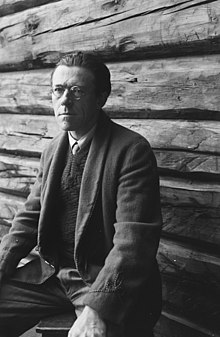Peter Wessel Zapffe | |
|---|---|
 Zapffe in 1949 | |
| Born | 18 December 1899 Tromsø, Norway |
| Died | 12 October 1990 (aged 90) Asker, Norway |
| Alma mater | University of Oslo |
| Occupation(s) | Philosopher, author, artist, lawyer, mountaineer |
| Notable work |
|
| Spouses | Bergliot Espolin Johnson
(m. 1935; div. 1941)Berit Riis Christensen
(m. 1952) |
| Awards | Fritt Ord Honorary Award (1987)[1] |
| Era | 20th-century philosophy |
| School | |
| Language | Norwegian |
Main interests | Metaphysics, nihilism, philosophical pessimism |
Notable ideas |
|
Preview warning: Page using Template:Infobox philosopher with unknown parameter "influences"
Preview warning: Page using Template:Infobox philosopher with unknown parameter "influenced"
Peter Wessel Zapffe (18 December 1899 – 12 October 1990) was a Norwegian philosopher, author, artist, lawyer and mountaineer. He is often noted for his philosophically pessimistic and fatalistic view of human existence.[2] His system of philosophy was inspired by the German philosopher Arthur Schopenhauer, as well as his firm advocacy of antinatalism.[3] His thoughts regarding the error of human life are presented in the essay "The Last Messiah" ("Den sidste Messias", 1933).[4] This essay is a shorter version of his best-known work, the philosophical treatise On the Tragic (Om det tragiske, 1941).[2]
- ^ a b Cite error: The named reference
biowas invoked but never defined (see the help page). - ^ a b Tangenes, Gisle R. (March–April 2004). "The View from Mount Zapffe". Philosophy Now. Retrieved 12 April 2020.
- ^ Zapffe remarked that children are brought into the world without consent or forethought: "In accordance with my conception of life, I have chosen not to bring children into the world. A coin is examined, and only after careful deliberation, given to a beggar, whereas a child is flung out into the cosmic brutality without hesitation." The Humorous Pessimist (1990 documentary, subtitled in English) by NRK, 32:18-32:44. Original source (in Norwegian).
- ^ Zapffe, P.W. (25 November 2016). "The Last Messiah". After us.